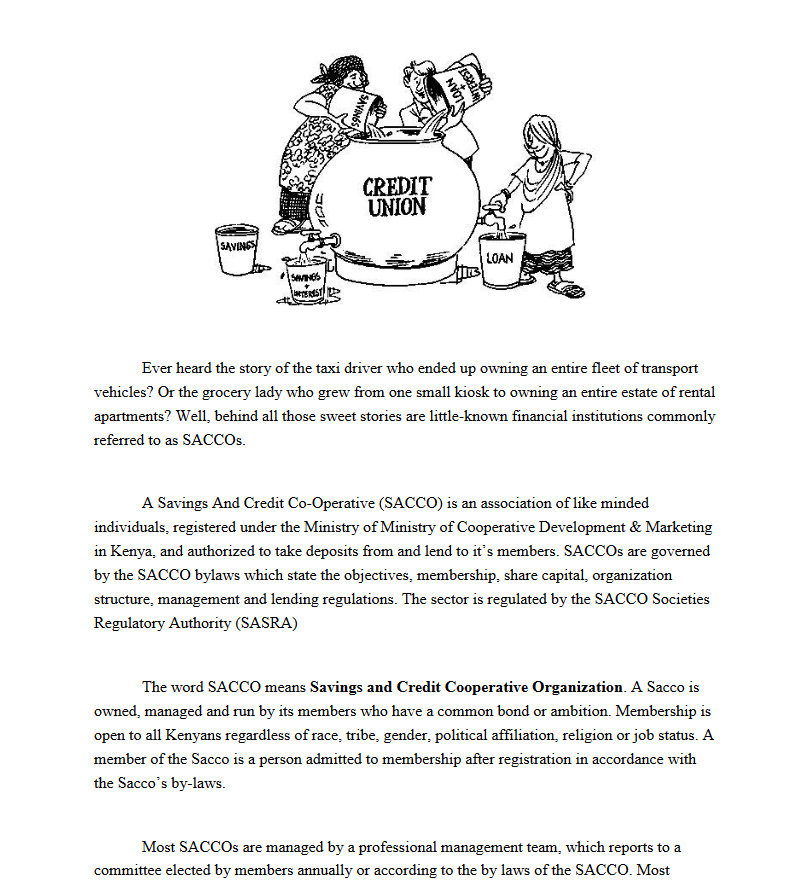SACCO & CHAMA Business Plan
SACCO & CHAMA Business Plan

SACCO & CHAMA Business Plan Overview
This SACCO & CHAMA Business Plan refers to the business of Savings And Credit Co-Operative (SACCO) is an association of like minded individuals, registered under the Ministry of Ministry of Cooperative Development & Marketing in Kenya, and authorized to take deposits from and lend to it’s members. SACCOs are governed by the SACCO bylaws which state the objectives, membership, share capital, organization structure, management and lending regulations. The sector is regulated by the SACCO Societies Regulatory Authority (SASRA).
The word SACCO means Savings and Credit Cooperative Organization. A Sacco is owned, managed and run by its members who have a common bond or ambition. Membership is open to all Kenyans regardless of race, tribe, gender, political affiliation, religion or job status. A member of the Sacco is a person admitted to membership after registration in accordance with the Sacco’s by-laws.
Most SACCOs are managed by a professional management team, which reports to a committee elected by members annually or according to the by laws of the SACCO. Most SACCOs in Kenya have restricted membership to industry or sector of working. For example Stima SACCO is for Power generation and distribution sector employees, while Magereza SACCO is formed by Prison Services employees.
The Sacco industry is part of the cooperative sector in Kenya, which has impacted on lives of many disadvantaged Kenyans over the years. Saccos in Kenya may be categorized into financial and non-financial cooperatives.
Non-financial cooperatives deal with the marketing of members’ produce and services such as dairy, livestock coffee, tea, handicrafts and many more similar cooperatives. On the other hand financial cooperatives comprise Saccos, housing and investment cooperatives.
The Sacco sub sector can be described as two-tiered given the range of financial services to members and regulatory regime. The traditional Savings and Credit Cooperative Societies (Saccos), described in law as Non-Deposit taking Saccos provide a limited range of savings and credit products, are registered and supervised under the Cooperative Services Act, CAP 490.
The Deposit Taking Saccos (DTS) besides the basic savings and credit products, also provide basic ‘banking’ services (demand deposits, payments services and channels such as quasi banking services commonly known as ATMs), FOSA and are licensed and supervised under the Sacco Societies Act of, 2008. The general trend is that Saccos start as non-deposit taking Sacco business and grow to deposit taking Sacco business to expand the range of financial services to members.
By December 2015 there were over 6,000 registered non-deposit taking Saccos in Kenya, 1,995 of which were active. Active in this context means the Saccos that filed their audited financial statements with the Commissioner for Cooperative Development as a legal requirement.
By close of 2016, there were 215 deposit taking Saccos out of which one hundred and thirty-five (135) were licensed by SASRA. The remaining 80 Saccos were still working to satisfy the licensing requirements as they have up to June 17th 2015 to comply or cease deposit taking Sacco business. The 215 DTS account for 78% of the total assets and deposits of the entire Sacco sub-sector. Further, they command 82% of membership in the Sacco industry.
Download SACCO & CHAMA Business Plan / guide here